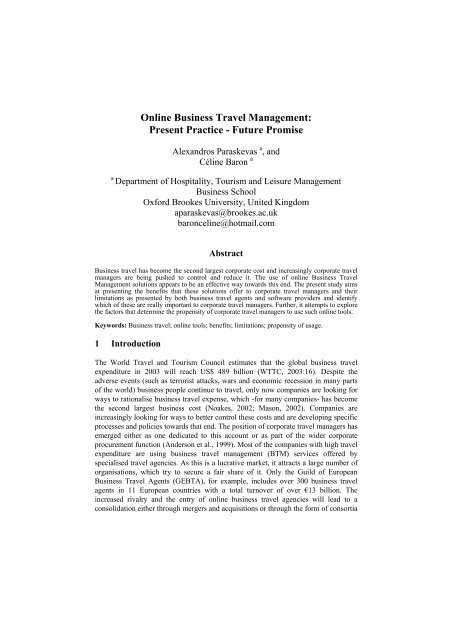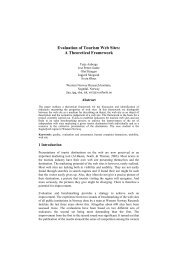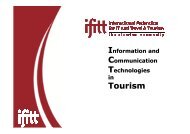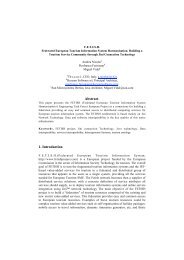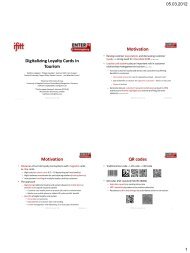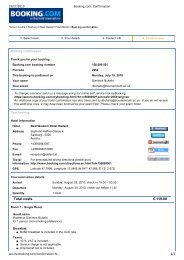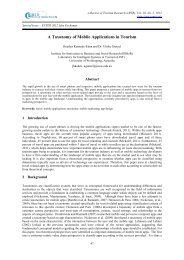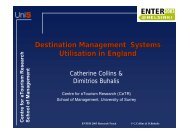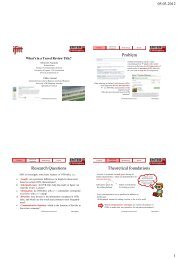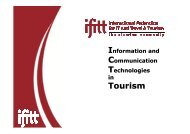Advice to authors for the preparation of camera?ready ... - IFITT
Advice to authors for the preparation of camera?ready ... - IFITT
Advice to authors for the preparation of camera?ready ... - IFITT
Create successful ePaper yourself
Turn your PDF publications into a flip-book with our unique Google optimized e-Paper software.
Online Business Travel Management:<br />
Present Practice - Future Promise<br />
Alexandros Paraskevas a , and<br />
Céline Baron a<br />
a<br />
Department <strong>of</strong> Hospitality, Tourism and Leisure Management<br />
Business School<br />
Ox<strong>for</strong>d Brookes University, United Kingdom<br />
aparaskevas@brookes.ac.uk<br />
baronceline@hotmail.com<br />
Abstract<br />
Business travel has become <strong>the</strong> second largest corporate cost and increasingly corporate travel<br />
managers are being pushed <strong>to</strong> control and reduce it. The use <strong>of</strong> online Business Travel<br />
Management solutions appears <strong>to</strong> be an effective way <strong>to</strong>wards this end. The present study aims<br />
at presenting <strong>the</strong> benefits that <strong>the</strong>se solutions <strong>of</strong>fer <strong>to</strong> corporate travel managers and <strong>the</strong>ir<br />
limitations as presented by both business travel agents and s<strong>of</strong>tware providers and identify<br />
which <strong>of</strong> <strong>the</strong>se are really important <strong>to</strong> corporate travel managers. Fur<strong>the</strong>r, it attempts <strong>to</strong> explore<br />
<strong>the</strong> fac<strong>to</strong>rs that determine <strong>the</strong> propensity <strong>of</strong> corporate travel managers <strong>to</strong> use such online <strong>to</strong>ols.<br />
Keywords: Business travel; online <strong>to</strong>ols; benefits; limitations; propensity <strong>of</strong> usage.<br />
1 Introduction<br />
The World Travel and Tourism Council estimates that <strong>the</strong> global business travel<br />
expenditure in 2003 will reach US$ 489 billion (WTTC, 2003:16). Despite <strong>the</strong><br />
adverse events (such as terrorist attacks, wars and economic recession in many parts<br />
<strong>of</strong> <strong>the</strong> world) business people continue <strong>to</strong> travel, only now companies are looking <strong>for</strong><br />
ways <strong>to</strong> rationalise business travel expense, which -<strong>for</strong> many companies- has become<br />
<strong>the</strong> second largest business cost (Noakes, 2002; Mason, 2002). Companies are<br />
increasingly looking <strong>for</strong> ways <strong>to</strong> better control <strong>the</strong>se costs and are developing specific<br />
processes and policies <strong>to</strong>wards that end. The position <strong>of</strong> corporate travel managers has<br />
emerged ei<strong>the</strong>r as one dedicated <strong>to</strong> this account or as part <strong>of</strong> <strong>the</strong> wider corporate<br />
procurement function (Anderson et al., 1999). Most <strong>of</strong> <strong>the</strong> companies with high travel<br />
expenditure are using business travel management (BTM) services <strong>of</strong>fered by<br />
specialised travel agencies. As this is a lucrative market, it attracts a large number <strong>of</strong><br />
organisations, which try <strong>to</strong> secure a fair share <strong>of</strong> it. Only <strong>the</strong> Guild <strong>of</strong> European<br />
Business Travel Agents (GEBTA), <strong>for</strong> example, includes over 300 business travel<br />
agents in 11 European countries with a <strong>to</strong>tal turnover <strong>of</strong> over €13 billion. The<br />
increased rivalry and <strong>the</strong> entry <strong>of</strong> online business travel agencies will lead <strong>to</strong> a<br />
consolidation ei<strong>the</strong>r through mergers and acquisitions or through <strong>the</strong> <strong>for</strong>m <strong>of</strong> consortia
such as <strong>the</strong> one al<strong>ready</strong> <strong>for</strong>med between Worldchoice, <strong>the</strong> Travel Trust Association<br />
and Midconsort, which includes more 1500 independent travel agents.<br />
Changes in <strong>the</strong> principals’ (airlines, hotels, car rental companies) policies mainly in<br />
<strong>the</strong> reduction if not elimination <strong>of</strong> commissions (Bray & Cohen, 2002) and <strong>the</strong>ir<br />
attempt <strong>for</strong> dis-intermediation through proprietary websites (Cline, 2001; Marcussen,<br />
1999; Middle<strong>to</strong>n & Clarke, 2001) resulted in many BTM agencies <strong>to</strong> review <strong>the</strong>ir<br />
pricing structure and charge <strong>the</strong>ir cus<strong>to</strong>mers fees <strong>for</strong> <strong>the</strong>ir services working now on<br />
behalf <strong>of</strong> <strong>the</strong>m as negotia<strong>to</strong>rs <strong>for</strong> best possible deals ra<strong>the</strong>r than being a distribu<strong>to</strong>r <strong>of</strong><br />
<strong>the</strong> principal (Mason, 2002). Also instead <strong>of</strong> concentrating only on big corporate<br />
clients -business travel market follows an acute <strong>for</strong>m <strong>of</strong> <strong>the</strong> 80/20 rule with more than<br />
80% <strong>of</strong> international business travel bookings made by less than 20% <strong>of</strong> corporate<br />
clients (Mintel 2000)- BTM agencies are increasingly getting interested in <strong>the</strong> SME<br />
market segment and launch dedicated services such as <strong>the</strong> CorporateChoice by<br />
Worldchoice.<br />
Increasingly, <strong>the</strong>se travel agencies are using -in various degrees- in<strong>for</strong>mation and<br />
communication technology (ICT) and <strong>the</strong> Internet <strong>to</strong> streamline <strong>the</strong>ir business process<br />
(Bray, 2002). A fur<strong>the</strong>r development in this area is <strong>the</strong> emergence <strong>of</strong> corporate webenabled<br />
self-booking systems by-passing <strong>the</strong> traditional BTM agencies (Del Rosso,<br />
2001). The benefits <strong>of</strong> <strong>the</strong> ‘e-trans<strong>for</strong>mation’ <strong>of</strong> corporate purchasing have been<br />
widely discussed in <strong>the</strong> generic literature (see, <strong>for</strong> example, Attaran & Attaran, 2002;<br />
Cooper-Jones & Macklin, 2002; Ovans, 2000) but have received little attention in <strong>the</strong><br />
business travel literature. The first step in understanding how <strong>the</strong> Internet has<br />
impacted this area would be <strong>to</strong> investigate how corporate travel managers employ <strong>the</strong><br />
Internet in purchasing. Towards this end, <strong>the</strong> present study addresses three research<br />
questions:<br />
RQ1: What are <strong>the</strong> perceived benefits <strong>of</strong>fered by <strong>the</strong> online BTM service provision<br />
and under which conditions can <strong>the</strong>se be achieved<br />
RQ2: What are <strong>the</strong> benefits that corporate travel managers in an online BTM service<br />
provision and what are <strong>the</strong> areas would <strong>the</strong>y like <strong>to</strong> see improved (RQ2a)<br />
What organisational, personal and environmental variables influence corporate<br />
travel managers’ propensity <strong>to</strong> use online BTM services (RQ2b)<br />
2 Business Travel Market and <strong>the</strong> Internet<br />
Technological developments such as <strong>the</strong> proliferation <strong>of</strong> <strong>the</strong> Internet and <strong>of</strong> e-<br />
commerce have also had an impact on BTM. Price transparency has increased <strong>the</strong><br />
bargaining power <strong>of</strong> cus<strong>to</strong>mers and new online intermediaries such as Expedia<br />
Corporate Travel have entered in this market and many BTM agencies have<br />
developed a “clicks-and-mortar” presence (Palmer & McCole, 1999; Buhalis, 2003).<br />
A challenge <strong>for</strong> BTM agencies is <strong>the</strong> emergence <strong>of</strong> business travel e-procurement<br />
solutions such as GetThere in <strong>the</strong> US or KDS and I:fao in Europe that have been
developed by independent s<strong>of</strong>tware companies. Similarly, GDS companies have<br />
developed <strong>the</strong>ir own booking solutions, such as Highwire (Galileo), Corporate.Res<br />
(Sabre) and Trip Manager (Worldspan). These web-based BTM systems enable<br />
companies <strong>to</strong> take advantage <strong>of</strong> special business fares and at <strong>the</strong> same time, <strong>the</strong>y<br />
provide controls <strong>to</strong> track savings and prevent abuses (Bray, 2002).<br />
The benefits <strong>of</strong>fered by <strong>the</strong> au<strong>to</strong>mation and <strong>the</strong> web-enablement <strong>of</strong> business processes<br />
has been widely discussed in both generic and <strong>to</strong>urism literature (see <strong>for</strong> example,<br />
Dutta & Segev, 1999; Brew<strong>to</strong>n & Kingseed, 2001; Werthner, H. & Klein, S. 1999;<br />
Cline, 2001). The e-trans<strong>for</strong>mation <strong>of</strong> BTM service provision however, <strong>of</strong>fers a series<br />
<strong>of</strong> business travel-specific benefits <strong>to</strong> corporate clients that have not been recorded by<br />
<strong>the</strong> extant literature. On <strong>the</strong> o<strong>the</strong>r hand, <strong>the</strong>se benefits may be achieved only under<br />
certain conditions. RQ1 by adopting a descriptive approach, aim at exploring <strong>the</strong>se<br />
benefits and <strong>the</strong> possible limitations <strong>of</strong> <strong>the</strong> online BTM. This will be achieved by<br />
recording <strong>the</strong> views <strong>of</strong> key BTM suppliers. Then, RQ2a will explore <strong>the</strong> importance<br />
corporate travel managers attach <strong>to</strong> <strong>the</strong>se benefits or limitations <strong>of</strong> <strong>the</strong> online service<br />
provision.<br />
Several models have been developed in order <strong>to</strong> explain IT innovation adoption. In<br />
<strong>the</strong> case <strong>of</strong> online BTM <strong>the</strong> <strong>authors</strong> have chosen <strong>the</strong> model proposed by Gallivan<br />
(2001). The model suggests that <strong>the</strong>re are three main categories <strong>of</strong> fac<strong>to</strong>rs that can<br />
influence <strong>the</strong> adoption <strong>of</strong> an IT innovation at user level (i.e., corporate travel<br />
manager’s level): a) managerial interventions, which include <strong>the</strong> actions taken and<br />
resources made available by managers <strong>to</strong> expedite end user adoption including<br />
mandating usage (Leonard-Bar<strong>to</strong>n & Deschamps, 1988; Agarwal, 2000), b) subjective<br />
norms describing individuals' beliefs about <strong>the</strong> expectations <strong>of</strong> relevant o<strong>the</strong>rs<br />
regarding <strong>the</strong>ir own secondary adoption behaviour (Saga & Zmud, 1994), and c)<br />
facilitating conditions that include o<strong>the</strong>r fac<strong>to</strong>rs that can make <strong>the</strong> adoption more<br />
likely (Orlikowski, 1993).<br />
3 Methodology<br />
The researchers needed <strong>to</strong> first clearly define <strong>the</strong> term “business travel” in <strong>the</strong> context<br />
<strong>of</strong> <strong>the</strong> study, as <strong>the</strong>re is not a universally agreed definition (De Sèze, 2002). The<br />
definition <strong>of</strong> “business travel” proposed by Davidson and Cope (2003:3) was adopted<br />
in this research, excluding this way all travel made <strong>for</strong> conferences and meetings,<br />
exhibitions, incentives and corporate hospitality, which <strong>the</strong> <strong>authors</strong> define as<br />
“business <strong>to</strong>urism”.<br />
In <strong>the</strong> first phase <strong>of</strong> <strong>the</strong> study, <strong>the</strong> researchers conducted semi-structured interviews<br />
with nine major players in <strong>the</strong> supply side (classified as traditional ‘bricks-andmortar’,<br />
‘clicks-and-mortar’ and ‘pure-play’ online travel agents as well as travel<br />
procurement s<strong>of</strong>tware developers) in order <strong>to</strong> map <strong>the</strong> benefits and limitations <strong>of</strong>
online BTM provision as well as in order <strong>to</strong> get some industry insight <strong>for</strong> future trends<br />
and developments in this market. A purposive sampling method, which allowed <strong>the</strong><br />
researchers <strong>to</strong> use <strong>the</strong>ir judgement <strong>for</strong> <strong>the</strong> selection <strong>of</strong> people that would best enable<br />
<strong>the</strong>m <strong>to</strong> answer RQ1, due <strong>the</strong>ir specialist knowledge in <strong>the</strong> matter (Saunders, Lewis<br />
and Thornhill, 2000). Twenty BTM companies, providing solutions ei<strong>the</strong>r online,<br />
<strong>of</strong>fline or both were initially contacted. Their contact details were found ei<strong>the</strong>r in <strong>the</strong><br />
<strong>of</strong> <strong>the</strong> Guild <strong>of</strong> Business Travel Agents website (http://www.gebta.com) or directly on<br />
<strong>the</strong>ir company’s website (identified through normal Internet search). Seven <strong>of</strong> <strong>the</strong>m<br />
agreed <strong>to</strong> participate, giving a response rate <strong>of</strong> 35% not compromising <strong>the</strong><br />
representativeness <strong>of</strong> <strong>the</strong> various types <strong>of</strong> providers in terms <strong>of</strong> sizes and services<br />
<strong>of</strong>fered.<br />
In <strong>the</strong> second phase, 250 questionnaires were e-mailed <strong>to</strong> corporate travel managers /<br />
travel procurement <strong>of</strong>ficers in UK, France, Greece, Cyprus, Malta, Italy and Spain in<br />
order <strong>to</strong> address RQ2. This was a purely convenience sample “simply available <strong>to</strong> <strong>the</strong><br />
researcher by virtue <strong>of</strong> its accessibility” (Bryman, 2001:97). The contact details were<br />
found in <strong>the</strong> Internet, <strong>the</strong> business travel trade press and in <strong>the</strong> cus<strong>to</strong>mers’ list <strong>of</strong> a<br />
B2B electronic marketplace based in Greece but serving <strong>the</strong> whole Mediterranean.<br />
Sixty-seven questionnaires were responded, <strong>of</strong> which, only fifty-six were usable<br />
(effective response rate 22.4%).<br />
4 Results<br />
4.1 Interviews with Online Suppliers<br />
The interviews with <strong>the</strong> BTM suppliers were recorded and transcribed verbatim. Each<br />
researcher analysed <strong>the</strong> transcribed interviews separately and <strong>the</strong> identified benefits<br />
and limitations <strong>of</strong> online BTM were listed <strong>for</strong> each interview. The findings were<br />
reviewed <strong>to</strong> avoid repetitions and <strong>the</strong>n <strong>the</strong>mes that were emerging have been<br />
identified and coded. The results <strong>of</strong> <strong>the</strong>se individual analyses were <strong>the</strong>n compared<br />
giving a Cohen’s Kappa intercoder reliability (Hughes and Garrett, 1990) <strong>of</strong> 88.2%.<br />
In terms <strong>of</strong> data management benefits all <strong>the</strong> respondents have <strong>the</strong> view that <strong>the</strong> main<br />
benefit <strong>of</strong> online BTM is <strong>the</strong> centralisation <strong>of</strong> data, which ensures consistency <strong>of</strong> <strong>the</strong><br />
process, allows objective internal analysis and evaluation and avoids redundancies <strong>of</strong><br />
data s<strong>to</strong>rage in <strong>the</strong>, perhaps, several units <strong>of</strong> <strong>the</strong> corporate client. Travel in<strong>for</strong>mation<br />
and <strong>of</strong>fers can be obtained from several sources since <strong>the</strong>se <strong>to</strong>ols are highly flexible.<br />
In <strong>the</strong> words <strong>of</strong> one respondent: “The <strong>to</strong>ol can work with different agencies. For<br />
instance, it enables a company that works with Carlson Wagonlit in three countries <strong>to</strong><br />
work with Amex in o<strong>the</strong>rs”. Cross-supplier flexibility is also achieved since “[The<br />
online BTM solutions work]… with any GDS, even <strong>for</strong> GDSs companies which have<br />
developed <strong>the</strong>ir own online booking <strong>to</strong>ol”, such as Highwire developed by Galileo,<br />
“<strong>the</strong>y still have <strong>to</strong> collaborate with <strong>the</strong> three o<strong>the</strong>r GDSs”.
Continuous connectivity (24/7/365) between service providers, travel managers,<br />
accounting units and travellers improves speed <strong>of</strong> communication, accuracy <strong>of</strong> data<br />
transfers and flexibility. Proper workflow management will additional <strong>of</strong>fer cost<br />
savings, while additional communication expenses with travellers are minimised since<br />
a number <strong>of</strong> functions (such as administration <strong>of</strong> mile account) can now be managed<br />
online. BTM s<strong>of</strong>tware providers that corporate clients can cut <strong>the</strong> travel agent fee by<br />
booking directly on <strong>the</strong> GDS or even minimise GDS costs by direct interface linking<br />
<strong>to</strong> principals (e.g. low cost carriers, rail, hotels, etc.).<br />
Travel policy con<strong>for</strong>mity is ensured through au<strong>to</strong>matic check <strong>of</strong> corporate travel<br />
guidelines and restrictions, identification <strong>of</strong> exceptions and standardised authorisation<br />
procedures with traveller personal pr<strong>of</strong>iles and pre-trip reports. Policies can easily be<br />
reviewed and re-implemented.<br />
Streamlined booking process is ano<strong>the</strong>r benefit. Only guaranteed ‘best buy’ options<br />
that con<strong>for</strong>m <strong>to</strong> <strong>the</strong> travel policy (e.g., approved suppliers only) are <strong>of</strong>fered,<br />
authorisation and billing arrangements are processed au<strong>to</strong>matically, allowing <strong>the</strong><br />
persons involved <strong>to</strong> concentrate on core business activities ra<strong>the</strong>r than bureaucratic<br />
procedures. Only “exceptions” need <strong>to</strong> be approved and processed through an explicit<br />
authorisation process. In essence, <strong>the</strong> web-enabled BTM <strong>to</strong>ol is at <strong>the</strong> same time<br />
in<strong>for</strong>mation and a sales point.<br />
Improved cost control through ‘real-time’ reporting can be achieved as <strong>the</strong> webbased<br />
BTM <strong>to</strong>ols <strong>of</strong>fer a series <strong>of</strong> pre-, during and after-trip reports. These reports<br />
allow <strong>the</strong> transparency <strong>of</strong> planned and actual travel costs, as well as <strong>the</strong> evaluation <strong>of</strong><br />
suppliers’ (travel agents and principals) per<strong>for</strong>mance, which in turn gives <strong>the</strong><br />
corporate client <strong>to</strong> re-organise and optimise <strong>the</strong> whole travel procurement and supply<br />
chain management process.<br />
As a result <strong>of</strong> all <strong>the</strong> above <strong>the</strong> billing procedure is simplified and in combination<br />
with <strong>the</strong> potential introduction <strong>of</strong> company credit cards <strong>for</strong> travel expenses, <strong>the</strong><br />
necessity <strong>of</strong> travel-related advances frees up a significant capital <strong>for</strong> <strong>the</strong> company,<br />
improving this way its cash flow.<br />
On <strong>the</strong> negative side, <strong>the</strong> technology dependence <strong>of</strong> <strong>the</strong>se <strong>to</strong>ols is <strong>the</strong>ir vulnerability.<br />
Concerns about <strong>the</strong> existing Internet infrastructure in <strong>the</strong> areas <strong>of</strong> network capacity,<br />
connection stability and reliability, telecom standards, speed <strong>of</strong> data transmission and<br />
security have been expressed. This technology dependence can also be an adverse<br />
fac<strong>to</strong>r in <strong>the</strong> diffusion <strong>of</strong> online bookings in a company since a number <strong>of</strong> travellers<br />
may be less computer literate.<br />
Ano<strong>the</strong>r limitation is <strong>the</strong> inability <strong>of</strong> online BTM <strong>to</strong>ols <strong>to</strong> deal with complex<br />
bookings. The current technology can support only standard ‘point-<strong>to</strong>-point’ trips and<br />
<strong>the</strong>re<strong>for</strong>e if corporate clients have more complex itineraries, <strong>the</strong>y have <strong>to</strong> direct <strong>the</strong>m<br />
<strong>to</strong> a BTM travel agency. This means that <strong>the</strong> corporate client has <strong>to</strong> classify travel in<strong>to</strong><br />
two categories: standard trips booked through <strong>the</strong> online solution and non-standard<br />
trips booked via <strong>the</strong> agent. As a result <strong>of</strong> this inability, <strong>the</strong> travel expense transparency<br />
may be compromised since it is guaranteed only when all <strong>the</strong> bookings use <strong>the</strong> online<br />
booking <strong>to</strong>ol.
The level <strong>of</strong> investment needed <strong>for</strong> online BTM solutions can also be ano<strong>the</strong>r<br />
constraint. The s<strong>of</strong>tware suppliers argued that only corporate clients with travel<br />
budgets in <strong>the</strong> area <strong>of</strong> €3.5 million could actually af<strong>for</strong>d proprietary BTM <strong>to</strong>ols.<br />
However, <strong>the</strong> business travel agents disagree and suggest that <strong>the</strong>y <strong>of</strong>fer online<br />
services <strong>to</strong> corporate clients with far smaller budgets.<br />
The decentralisation <strong>of</strong> <strong>the</strong> booking process and <strong>the</strong> transfer <strong>of</strong> certain process steps<br />
<strong>to</strong> <strong>the</strong> corporate traveller pose also a few problems. First, it is argued that <strong>the</strong> time<br />
consumed by better earning employees <strong>to</strong> book online <strong>the</strong> trips <strong>the</strong>mselves may<br />
invoke higher process costs than with a conventional telephone or e-mail booking<br />
request <strong>to</strong> <strong>the</strong> corporate travel manager. Second, corporate clients need <strong>to</strong> mandate <strong>the</strong><br />
usage <strong>of</strong> <strong>the</strong> online booking <strong>to</strong>ol in order <strong>to</strong> achieve <strong>the</strong> benefits mentioned above and<br />
this is not always easy as corporate travellers are used <strong>to</strong> <strong>the</strong> traditional way <strong>of</strong><br />
booking and still find it easier <strong>to</strong> talk <strong>to</strong> a human being, who will deal with <strong>the</strong> trip<br />
arrangements. One respondent argued: “This human contact and <strong>the</strong> trust can be<br />
created in <strong>the</strong> agent-traveller relationship can never be replaced by a s<strong>of</strong>tware. Look<br />
at Expedia Corporate Travel: <strong>the</strong>y <strong>of</strong>fer human contact as well”.<br />
Finally, <strong>the</strong> time and <strong>the</strong> cost <strong>of</strong> deployment (and change management) are a fur<strong>the</strong>r<br />
constraint. The deployment <strong>of</strong> such a solution requires a lot <strong>of</strong> <strong>preparation</strong> (clear<br />
travel policies, standard booking procedures, in<strong>for</strong>mation workflow mapping, job redesign<br />
and culture change). In <strong>the</strong> words <strong>of</strong> one respondent: “[…<strong>the</strong> solution<br />
deployment] varies tremendously and we do it on a client-by-client basis. It used <strong>to</strong> be<br />
very expensive, in fact, expensive enough <strong>to</strong> put people <strong>of</strong>f. It is only recently,<br />
particularly since <strong>the</strong> last 12 months, that clients accept <strong>the</strong> cost more easily”.<br />
4.2 Business Travel Managers<br />
The research on <strong>the</strong> demand side revealed that all corporate travel managers in <strong>the</strong><br />
sample use <strong>the</strong> services <strong>of</strong> a BTM agency. Sixteen <strong>of</strong> <strong>the</strong> respondents (28.57%) are<br />
using a specific online <strong>to</strong>ol (BTM agency portal or proprietary solution) while 42.87%<br />
<strong>of</strong> <strong>the</strong>m are using <strong>the</strong> Internet in general <strong>for</strong> in<strong>for</strong>mation on travel options. In <strong>the</strong><br />
questionnaire -among some o<strong>the</strong>r open-ended questions- <strong>the</strong> respondents were asked<br />
<strong>to</strong> indicate, using a 7-point Likert scale, <strong>the</strong> importance <strong>the</strong>ir organisation attached <strong>to</strong><br />
<strong>the</strong>se benefits and limitations (RQ2a). Cronbach’s alpha <strong>for</strong> this scale was 0.57. In<br />
order <strong>to</strong> find out <strong>the</strong> underlying fac<strong>to</strong>r structure associated with <strong>the</strong>se benefits and<br />
limitations, each item’s score was fac<strong>to</strong>r analysed, using principal component<br />
extraction with varimax rotation. The analysis produced eight significant fac<strong>to</strong>rs,<br />
explaining 81.2% <strong>of</strong> <strong>the</strong> variance (Table 2).<br />
It appears from this analysis that <strong>the</strong>ir main motive <strong>for</strong> using online BTM is <strong>the</strong> cost<br />
reduction potential <strong>of</strong> such a solution. They feel that <strong>the</strong>y have significant savings in<br />
terms <strong>of</strong> time, process and negotiation potential but also get <strong>the</strong> best available prices<br />
<strong>for</strong> <strong>the</strong> product <strong>the</strong>y are looking <strong>for</strong>. The second most important fac<strong>to</strong>r <strong>of</strong> online BTM<br />
provision is travel policy con<strong>for</strong>mity. Here, however, <strong>the</strong>re is a contradiction as in <strong>the</strong><br />
open-ended questions section 34 <strong>of</strong> <strong>the</strong> respondents (60.70%) admitted that <strong>the</strong>y are<br />
still using a manual authorisation process. One reason <strong>for</strong> that may be <strong>the</strong> fact that a
high percentage <strong>of</strong> <strong>the</strong>ir travel bookings are “non-standard” trips (73.21% <strong>of</strong> <strong>the</strong><br />
respondents stated that “non-standard” trips account <strong>for</strong> more than 30% <strong>of</strong> <strong>the</strong>ir<br />
bookings, while all <strong>the</strong> rest stated that <strong>the</strong>y account <strong>for</strong> more than 20% <strong>of</strong> <strong>the</strong>ir<br />
bookings). The inability <strong>of</strong> <strong>the</strong> online service provision <strong>to</strong> deal with complex<br />
Table 1. Fac<strong>to</strong>r Analysis: Importance <strong>of</strong> Online BTM Features<br />
Fac<strong>to</strong>rs Eigen value COM. C.F.<br />
IMPORTANCE OF ONLINE BTM FEATURES<br />
Alpha = 0.57<br />
Proportion <strong>of</strong> Variance accounted <strong>for</strong> = 81.2%<br />
F1 Travel Cost Management 3.7<br />
V14 Guaranteed 'best buy' options 0.87 0.81<br />
V12 Cost optimisation in travel partnerships 0.78 0.68<br />
V6 Savings from process streamlining 0.77 0.65<br />
V8 Pre-trip cost transparency 0.55 0.47<br />
F2 Travel Policy Con<strong>for</strong>mity 2.6<br />
V1 Au<strong>to</strong>matic check <strong>of</strong> guidelines/restrictions 0.75 0.70<br />
V7 Identification <strong>of</strong> "exceptions" 0.67 0.76<br />
F3 Data Centralisation 2.3<br />
V4 Process consistency throughout <strong>the</strong> organisation 0.81 0.82<br />
V18 Reduced paperwork and data s<strong>to</strong>rage needs 0.84 0.78<br />
F4 Inability <strong>to</strong> Deal with Complex Bookings 1.9<br />
V16 Majority <strong>of</strong> trips are point-<strong>to</strong>-point* 0.81 0.84<br />
V17 Majority <strong>of</strong> trips are with one only transport* 0.74 0.64<br />
F5 Real time reporting 1.7<br />
V10 Comparability <strong>of</strong> planned vs. actual costs 0.88 0.89<br />
V15 Travel partners per<strong>for</strong>mance 0.82 0.69<br />
F6 Level <strong>of</strong> investment needed 1.4<br />
V2 Deployment costs 0.87 0.91<br />
V3 Change management costs 0.80 0.56<br />
V5 Training costs 0.70 0.50<br />
F7 Technology dependence 1.2<br />
V19 Reliable internet infrastructure* 0.84 0.85<br />
V20 Secure transmission <strong>of</strong> data* 0.86 -0.44<br />
F8 Simplified billing procedure 1<br />
V11 Simplified billing procedure 0.86 0.92<br />
Note: * item was reverse coded<br />
itineraries is identified as its greatest limitation. Two surprising findings were that real<br />
time reporting and <strong>the</strong> simplification <strong>of</strong> billing procedure were not deemed as<br />
important as <strong>the</strong> researchers thought. Quite significant importance was also attached
<strong>to</strong> deployment and change management costs as well as <strong>to</strong> <strong>the</strong> lack <strong>of</strong> appropriate<br />
Internet infrastructure and security. Very low (not significant enough) importance was<br />
attached <strong>to</strong> <strong>the</strong> 24/7/365 connectivity with <strong>the</strong> BTM service provider, which was also<br />
surprising.<br />
O<strong>the</strong>r questions in <strong>the</strong> questionnaire revealed that 73.21% <strong>of</strong> <strong>the</strong> respondents have an<br />
internal travel expense reporting system, while 17.86% rely on <strong>the</strong>ir BTM service<br />
provider/<strong>to</strong>ol and 8.93% admitted that <strong>the</strong>y do not have a special travel related<br />
reporting system. In terms <strong>of</strong> reports used, <strong>the</strong> traditional “accounting” reports<br />
(volume booked per supplier, credit card reconciliation, travel activity per<br />
department/traveller) were mentioned <strong>the</strong> most.<br />
The users <strong>of</strong> online or au<strong>to</strong>mated report systems found <strong>the</strong> cost savings/ loss analysis<br />
reports <strong>the</strong> most useful, followed by <strong>the</strong> pre-trip reports. Fur<strong>the</strong>r, a 65% <strong>of</strong> <strong>the</strong> nonusers<br />
would move <strong>to</strong> an online <strong>to</strong>ol if <strong>the</strong> costs were not prohibitive while 12.5% are<br />
planning <strong>to</strong> move <strong>to</strong> such as solution within <strong>the</strong> next two years. As far as <strong>the</strong><br />
improvements <strong>the</strong>y would like <strong>to</strong> see in <strong>the</strong> online provision, <strong>the</strong> <strong>to</strong>p requests were <strong>the</strong><br />
ability <strong>to</strong> book “non-standard” trips, <strong>the</strong> ability <strong>to</strong> make changes online without<br />
having <strong>to</strong> call <strong>the</strong> BTM agent and <strong>the</strong> ability <strong>to</strong> talk immediately <strong>to</strong> someone online<br />
when facing problems or have queries.<br />
In order <strong>to</strong> address RQ2b, <strong>the</strong> <strong>authors</strong> have developed a series <strong>of</strong> statements with<br />
which <strong>the</strong> respondents were asked <strong>to</strong> show <strong>the</strong> degree <strong>of</strong> <strong>the</strong>ir agreement using again a<br />
7-point Likert scale. To this end <strong>the</strong>y used <strong>the</strong> Gallivan (2001) model, slightly<br />
modified with <strong>the</strong> addition <strong>of</strong> certain variables related with online BTM usage, such<br />
as “pressure <strong>to</strong> reduce travel expense” in <strong>the</strong> managerial interventions construct and<br />
“market turbulence” (Jaworski & Kohli, 1993) in <strong>the</strong> facilitating conditions, <strong>to</strong><br />
capture <strong>the</strong> influence <strong>of</strong> fac<strong>to</strong>rs such as 9/11 and SARS on business travel. The results<br />
<strong>of</strong> <strong>the</strong> regression analysis are summarised in Table 2.<br />
The results suggest that <strong>the</strong> fac<strong>to</strong>rs proposed by <strong>the</strong> adapted Gallivan model are only<br />
partially supported. With respect <strong>to</strong> managerial interventions, <strong>the</strong> analysis indicates<br />
that <strong>the</strong> pressure <strong>to</strong> reduce overall travel expenditure is a very strong influencer as<br />
well as <strong>the</strong> management commitment <strong>to</strong> manda<strong>to</strong>ry usage <strong>of</strong> an online BTM <strong>to</strong>ol by<br />
all corporate travellers. Significant as well is <strong>the</strong> training <strong>the</strong> travel managers receive<br />
and <strong>the</strong> support (in terms <strong>of</strong> o<strong>the</strong>r resources) <strong>of</strong>fered by senior management <strong>to</strong> <strong>the</strong>m.<br />
Regarding subjective norms, an important fac<strong>to</strong>r that would affect <strong>the</strong> corporate travel<br />
managers’ propensity <strong>to</strong> use online <strong>to</strong>ol is <strong>the</strong> usage <strong>of</strong> <strong>the</strong> <strong>to</strong>ol by o<strong>the</strong>r travel<br />
managers in <strong>the</strong>ir industry sec<strong>to</strong>r. Very little influence appears <strong>to</strong> have <strong>the</strong> corporate<br />
travellers as well as <strong>the</strong> s<strong>of</strong>tware providers and <strong>the</strong> business travel agencies on <strong>the</strong>ir<br />
decision <strong>to</strong> adopt <strong>the</strong> online BTM solution.<br />
Quite interesting is <strong>the</strong> finding that market conditions (such as 9/11 and SARS) have<br />
no influence on <strong>the</strong> propensity <strong>to</strong> use an online solution, contrary <strong>to</strong> anecdotal<br />
evidence that suggests <strong>the</strong> opposite. Also personal characteristics such as gender, age,
travel market expertise, or perceived Internet skill appear <strong>to</strong> have little impact on <strong>the</strong>ir<br />
propensity <strong>to</strong> adopt an online solution. On <strong>the</strong> o<strong>the</strong>r hand, <strong>the</strong> benefits <strong>of</strong> an online<br />
BTM <strong>to</strong>ol are, as expected, an important fac<strong>to</strong>r <strong>for</strong> its adoption.<br />
Table 2. Fac<strong>to</strong>rs Influencing Corporate Travel Managers’ Propensity <strong>for</strong> Online BTM<br />
Construct Fac<strong>to</strong>rs Stand t p≤<br />
Beta<br />
Managerial Interventions Manda<strong>to</strong>ry usage 0.16 2.57 0.01<br />
Training and Support 0.15 2.12 0.02<br />
Pressure <strong>to</strong> reduce travel costs 0.42 6.51 0.00<br />
Subjective Norms Influence by o<strong>the</strong>r travel managers 0.15 2.58 0.01<br />
Influence by travelers 0.04 0.62 0.54<br />
Influence by BTM suppliers -0.01 -0.22 0.83<br />
Facilitating conditions Market turbulence -0.11 -1.85 0.07<br />
Online BTM attributes 0.12 2.02 0.04<br />
Travel Manager attributes 0.09 1.45 0.15<br />
Global Test <strong>of</strong> Model Fit: F=14.06, p=0.000, Adjusted R² =0.37<br />
5 Conclusion<br />
The study indicates a positive trend <strong>to</strong>wards online travel procurement solutions<br />
mainly <strong>for</strong> <strong>the</strong> large corporate clients and those with a large percentage <strong>of</strong> standard<br />
'point-<strong>to</strong>-point' trips. The main influences in this trend are <strong>the</strong> increased pressure <strong>to</strong><br />
travel expense reduction and <strong>the</strong> escalating adoption <strong>of</strong> online solutions (ei<strong>the</strong>r BTM<br />
agents portals, wider Internet searches, or dedicated s<strong>of</strong>tware). However, <strong>the</strong> study<br />
shows that <strong>the</strong>re is a great need <strong>for</strong> Senior Management commitment and support<br />
<strong>to</strong>wards <strong>the</strong> usage <strong>of</strong> such solutions. It is also evident that quite a few companies need<br />
<strong>to</strong> become more entrepreneurial in <strong>the</strong> way <strong>the</strong>y handle business travel as -at <strong>the</strong> time<strong>the</strong>y<br />
manage it simply as an operational cost and not as a negotiating <strong>to</strong>ol. The main<br />
inhibi<strong>to</strong>rs in <strong>the</strong> diffusion <strong>of</strong> online BTM are <strong>the</strong> lack <strong>of</strong> reliable network<br />
infrastructure and <strong>the</strong> ongoing distrust <strong>of</strong> users in <strong>the</strong> transfer <strong>of</strong> crucial organisational<br />
data through <strong>the</strong> Internet. Cost and ROI is ano<strong>the</strong>r source <strong>of</strong> resistance <strong>for</strong> <strong>the</strong> use <strong>of</strong><br />
such solutions but <strong>the</strong> study shows that <strong>the</strong>ir adopters realise considerable savings in<br />
<strong>the</strong> travel booking and authorisation process as well as reduction in <strong>the</strong> actual travel<br />
costs.<br />
There are obviously several limitations in <strong>the</strong> findings <strong>of</strong> this study mainly due <strong>to</strong><br />
convenience sampling and perhaps methodological errors despite <strong>the</strong> ef<strong>for</strong>ts made <strong>to</strong><br />
ensure face validity in <strong>the</strong> corporate travel management context. Although<br />
generalisability <strong>of</strong> <strong>the</strong>se findings may not be feasible, <strong>the</strong> study attempts a first<br />
exploration in an area that looks very promising equally <strong>for</strong> business consultants and<br />
researchers.
References<br />
Anderson,R.I., Lewis,.D. and Parker,.M.E. (1999). Ano<strong>the</strong>r Look at <strong>the</strong> Efficiency <strong>of</strong><br />
Corporate Travel Management Departments, Journal <strong>of</strong> Travel Research, 37(3), 267-<br />
272.<br />
Agarwall, R. (2000). Individual acceptance <strong>of</strong> IT, in R.W. Zmud (Ed.) Framing <strong>the</strong> Domains <strong>of</strong><br />
IT Management: Projecting <strong>the</strong> Future through <strong>the</strong> Past, Cincinatti: Pinnaflex Press,<br />
85-104.<br />
Attaran, M. and Attaran, S. (2002). Catch <strong>the</strong> Wave <strong>of</strong> E-procurement. Industrial Management,<br />
44(3), 16-21.<br />
Bray, R. (2002). AMEX <strong>to</strong> Upgrade Self-booking, Financial Times, June 18.<br />
Brew<strong>to</strong>n, T. and Kingseed, K. (2001). Getting <strong>the</strong> Most from your B2B-Enabled Supply Chain.<br />
Journal <strong>of</strong> Business Strategy, 22(1), 29-31.<br />
Buhalis, D. (2003). E-Tourism: IT <strong>for</strong> Strategic Tourism Management, London: Prentice Hall<br />
Cline, R. (2001). The Future <strong>of</strong> Hospitality E-Business: How <strong>the</strong> Internet Has Changed <strong>the</strong><br />
Hotel Industry. Lodging Hospitality 57(7): 24-30.<br />
Cooper-Jones, T. and Macklin, C. (2002). Buy by Wire. Financial Management (CIMA), April,<br />
28-29.<br />
Davidson, R. and Cope, B. (2003). Business Travel: Conferences, Incentive Travel, Exhibitions,<br />
Corporate Hospitality and Corporate Travel, London: Pearson Education Ltd.<br />
Del Rosso, L. (2001). Self-Booking System Rates Increase, Travel Weekly, 60(77), 41.<br />
De Sèze, B. (2002). Panorama du Tourisme d’ Affaires, [Available on-line:<br />
http://www.<strong>to</strong>urisme.gouv.fr/etudes/<strong>to</strong>urismeaffaires.htm, March 24, 2003].<br />
Dutta, S and Segev, A. (1999). Business Trans<strong>for</strong>mation on <strong>the</strong> Internet. European<br />
Management Journal, 17(5), 466-476.<br />
Flynn, L. J. (2003). Teleconference Business Up as SARS fuels Demand, New York Times,<br />
[Available online: http://www.nytimes.com/2003/05/12/technology, May 12, 2003).<br />
Gallivan, M.J. (2001). Organisational Adoption and Assimilation <strong>of</strong> Complex Technological<br />
Innovations, The DATA BASE <strong>for</strong> Advances in In<strong>for</strong>mation Systems, 32(3), 51-85<br />
Hughes, M.A. and. Garrett D.E (1990), Intercoder Reliability Estimation Approaches in<br />
Marketing: A Generalizability Theory Framework <strong>for</strong> Quantititative Data, Journal <strong>of</strong><br />
Marketing Research, 27 (2), pp. 185-195.<br />
Jaworski, B.J. and Kohli, A.K. (1993). Market Orientation: Antecedents and Consequences.<br />
Journal <strong>of</strong> Marketing, 57(3), 53-70.<br />
Leonard Bar<strong>to</strong>n, D., and Deschamps, I. (1988). Managerial Influence in <strong>the</strong> Implementation <strong>of</strong><br />
New Technology, Management Science, 34(10), 1252-1265.<br />
Marcussen, C.H. (1999) The Effects <strong>of</strong> Internet Distribution <strong>of</strong> Travel and Tourism Services on<br />
<strong>the</strong> Marketing Mix: No Frills, Fair Fares, and Fare Wars in <strong>the</strong> Air. In<strong>for</strong>mation<br />
Technology and Tourism 2(3/4): 197-212.<br />
Mason, K.J. (2002). Future Trends in Business Travel Decision Making, Journal <strong>of</strong> Air<br />
Transportation, 7(1), 47-68.<br />
Middle<strong>to</strong>n V. and Clarke, J. (2001). Marketing in Travel and Tourism. (3rd. ed.), Ox<strong>for</strong>d:<br />
Butterworth-Heinemann.<br />
Noakes, G. (2002). Companies Take Low-cost Option, Travel Trade Gazette UK and Ireland,<br />
April 2.<br />
Orlikowski, W.J. (1993). CASE Tools as Organisational Change: Investigating Incremental and<br />
Radical Changes in Systems Development, MIS Quarterly, 17(3), 309-340.<br />
Ovans, A. (2000). E-Procurement at Schlumberger. Harvard Business Review, 78(3), 21-22.<br />
Palmer, A. and McCole, P. (1999). The Virtual Re-Intermediation <strong>of</strong> Travel Services: A<br />
Conceptual Framework and Empirical Investigation. Journal <strong>of</strong> Vacation Marketing<br />
6(1):33-47<br />
Werthner, H. & Klein, S. (1999). In<strong>for</strong>mation Technology and Tourism: A Challenging<br />
Relationship, Vienna: Springer Verlag.<br />
Wilkinson, T. (2001). Au<strong>to</strong>mating Corporate Travel Management, Travel Weekly, 60(34), F10.<br />
World Travel and Tourism Council. (2003). European Union, Travel and Tourism: A World <strong>of</strong><br />
Opportunity. The 2003 Travel and Tourism Economic Research [Available online:<br />
http://www.wttc.org/measure/PDF/European%20Union.pdf , April 15, 2003].


